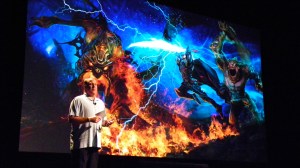Alright. So let’s talk about the game, insomuch as we can. What do you think are the biggest problems with the way fantasy shows up in video games right now, and how do you feel like ‘Reckoning’ is going to address them?
Curt Schilling: Well, I am going to talk about from the gamer’s perspective, then Mark can talk from the design perspective. So for me, I can think of a ton of games I have played in my lifetime that I loved where story felt like an afterthought. And most times it is an afterthought, because people don’t understand how hard making games is at the base level; both in time and money. So the story piece is, always, “Yeah, we will get to that, we will get to that, we will get to that.” We started out with that as kind of the foundation of everything we did. So it’s a very story-driven product and all of them are very story-driven products. And then what you do is you take an R.A. Salvatore-created world which–again, I am a fantasy guy, so that’s cool–and you get a Todd McFarlane to put that thing to paper, and then it becomes even cooler.
And those two things in themselves are awesome, but they don’t mean squat when it comes to making a great game. Then you get a Ken Ralston and a Mark Nelson, and the guys in the Boston studio, and they take those ideas and they put those ideas to paper and they make game mechanics out of them, and that’s where the magic happens.
Mark Nelson: I mean, I think one of the things that we have been solid with, just sort of within the RPG development community is, we are so tied to the old paper games and to the old PC games, and it took us a while kind of to learn that we don’t have to do these things anymore, like we can make these games more moment to moment fun and not lose any of that real crunchy RPG goodness. So we got to really start from the ground-up. We weren’t tied to games that have been going back 20 years and we had to have the exact same systems.
We were able to start fresh and say, here the things we know we love, here are the things we know work moment-to-moment, and really just be able to build from there. It has been kind of a liberating thing for us, but I think it’s going to really show up in the final product.
So you feel like there is kind of this legacy mindset on the behalf of the players more so than the developers?
Mark Nelson: I think it’s a little bit with everyone, and quite honestly, when we started developing, we said, “Okay, we’ve got all this stuff, that’s all this legacy stuff. Everything is a number, it’s got all these deep, deep stats. We are going to pull a lot of that out.” And we did. We pulled out a ton of that stuff, and when we were done, we went, we have got a heck of an interesting game, but it’s not an RPG anymore. We had to kind of go too far and pull a lot of stuff out to go, okay, we are missing the core fun, like all of this RPG deep number crunching stuff really is fun, but we don’t have to make it a chore for the player to do. We can keep all of that, but still make it something that they can get their hands on quickly and enjoy, but still have that same level of customization and depth and character development that exists in all the old games. We can just bring it to them in a much nicer package.


